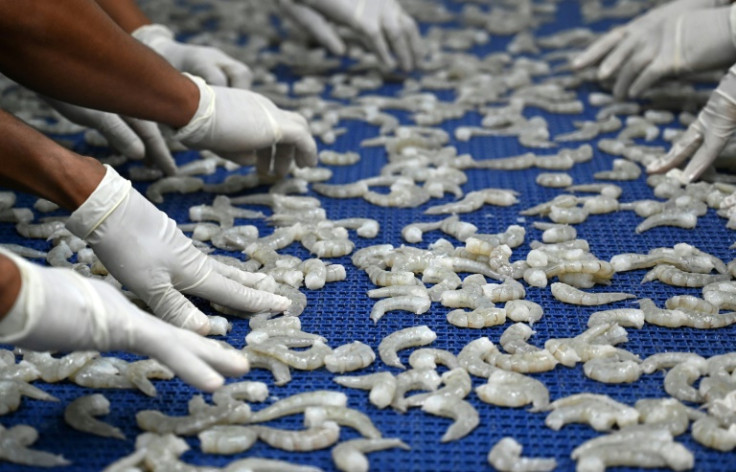Honduras Shrimp Industry Worried By Diplomatic Break With Taiwan

On the Pacific coast of Honduras, thousands of people working in the shrimp farming industry are worried about their futures following the government's decision to break diplomatic ties with their largest export market: Taiwan.
"We don't want them to stop business with Taiwan," Lorena de Jesus Zelaya, 51, who works in a shrimp packing plant, said to AFP.
Along with another 800 women, she works in a warehouse in Choluteca, around 85 kilometers (50 miles) south of the capital Tegucigalpa, where frozen shrimp is packaged and sent in refrigerated containers to Taiwan, Mexico and Europe.
Wearing a hat, apron and rubber shoes, Zelaya told AFP she has worked in the shrimp industry for 31 years.
Leftist President Xiomara Castro announced last month that she was breaking off diplomatic relations with Taiwan and signing on with China instead.
Shrimp workers fear that move could jeopardize the free-trade agreement between Honduras and Taiwan, signed in 2008, on which their livelihoods largely depend.
"For Honduras, as a shrimp producer, losing the Taiwanese market is a very difficult situation in terms of price levels," businessman Yader Rodriguez, 46, told AFP.
"Taiwan is a high-value market where our shrimp can sell at almost twice the price of the Chinese market."
Although the Chinese economy is 12 times larger than Taiwan's, "we're very worried about what this political decision will bring," he added.
Rodriguez said shrimp exports are worth about $100 million a year.
Although Taiwan is a self-ruled democratic island, China claims it as part of its territory to be integrated into the nation one day, by force if necessary.
Beijing refuses to have diplomatic relations with countries that recognize Taipei.
Castro's move followed in the footsteps of several other Latin American countries in recent years, including Nicaragua, El Salvador, Panama, Costa Rica and the Dominican Republic.
It leaves Taiwan with only 13 diplomatic allies, including Guatemala and Belize, which President Tsai Ing-wan visited last week.
The shrimp are farmed in huge artificial ponds using seawater from the nearby Gulf of Fonseca.
Since it launched in the 1970s, shrimp farming exploded in Honduras, with 324 farms covering an area of 24,500 hectares (60,000 acres).
Around 23,000 people are directly employed in the industry, but that figure rises to 150,000 when including those indirectly dependent on shrimp farming.
The National Aquaculturists Association of Honduras (ANDAH) has expressed its concerns in several meetings with authorities.
They fear Taiwan could simply refuse to buy shrimp from the Central American nation and have asked the government to write to Taiwan requesting the continuation of trade relations despite the diplomatic rupture.
"The government is open to listening and looking for solutions," said ANDAH president Juan Carlos Javier, adding that more than a third of shrimp export revenue last year came from Taiwan.
While the government has said nothing about its trade agreement with Taiwan, many people are deeply concerned about the ramifications of ending diplomatic cooperation.
"All the families are worried ... about this (trade) agreement they want to break," Carlos Abrego, 28, who works for a shrimp company, told AFP.
"We are really are very worried because here where we live, it's very serious to lose your job or to take a pay cut," added laborer Pedro Antonio Martinez, 34.
Shrimp is the fifth largest export for Honduras after coffee, bananas, sugar and palm oil.
Last year, the country's exports were worth $6.1 billion, with $130 million of that coming from Taiwan.



© Copyright AFP 2024. All rights reserved.





















